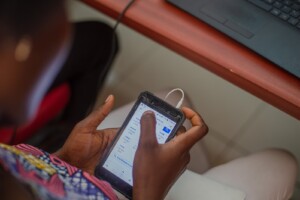NISS pulls plug on radio show, ‘restricts Sudan’s media’
The security authorities stopped a Sudanese radio programme that discussed corruption and nepotism in the country. Human rights and peace studies institutes have expressed their concern about the growing use of censorship by the security service.
A source from El Bait El Sudani Radio FM 100 informed Radio Dabanga that the Security and Intelligence Service (NISS) sent a letter to the radio director, Leila Awad, ordering announcer Lemiya Mutawakil to stop broadcasting the morning programme ‘Sabah El Buyot’ until further notice.
Last Saturday’s episode of the live programme received phone calls from a large number of listeners from all over Sudan. They criticised the government and held it responsible for the corruption, the collapse of the rule of law, and the loss of confidence in the judicial system. Also under discussion on the radio was the police of favouritism in the implementation of the law.
‘NISS abuses powers against press’
The security service’s move against El Bait El Sudani Radio is similar to the ‘post-print censorship’, whereby entire print runs of newspapers are confiscated prior to distribution. The African Centre for Justice and Peace Studies (ACJPS) and the International Federation for Human Rights (FIDH) expressed their concern about the security service’s growing use of this censorship in Sudan, which comes at a great cost to newspapers.
Their joint press statement on Tuesday follows the Sudanese Journalist Network’s quarterly report on the declining press freedoms in Sudan, after the NISS changed its approach to the press. ‘Whilst reasons are routinely not given, censorship has surged around key political events or issues deemed sensitive by the ruling National Congress Party (NCP).’
Restrictions on the media have severely limited the availability of independent and reliable information at a critical time in the history of Sudan: the general elections in April this year, the first to be held since South Sudan gained independence in 2011, ACJPS and FIDH write.
‘The Government of Sudan has increased its reliance on the NISS, using its broad powers of arrest and detention, search and seizure, under the National Security Act of 2010, to censor print and online media […] Journalists have been subjected to repeated summonses and threats of prosecution, arbitrary detention, blacklisting and other forms of harassment such threatening visits or telephone calls from the NISS ordering them not to report on socalled “red line” issues.’
They recounted a number of confiscations and arrests, including the confiscation of ten newspapers on 25 May this year [https://www.dabangasudan.org/en/all-news/article/sudan-security-seizes-print-runs-of-ten-newspapers-suspends-four ], and the detention of journalist Hassan Ishag [https://www.dabangasudan.org/en/all-news/article/police-torture-detained-journalist-in-sudan-s-west-kordofan] on 12 June, that lasted for more than three months.
The joint statement was released during the 57th session of the African Commission on Human and Peoples’ Rights in Gambia. The ACJPS and FIDH called on the commission’s chairperson to urge Sudan to end all crackdowns on the press and investigate arbitrary detentions and ill-treatment of journalists.
The security authorities stopped a Sudanese radio programme that discussed corruption and nepotism in the country. Human rights and peace studies institutes have expressed their concern about the growing use of censorship by the security service.
A source from El Beit El Sudani Radio FM 100 informed Radio Dabanga that the Security and Intelligence Service (NISS) sent a letter to the radio director, Leila Awad, ordering announcer Lemya Mutawakil to stop broadcasting the morning programme 'Sabah El Buyout' until further notice.
Last Saturday's episode of the live programme received phone calls from a large number of listeners from all over Sudan. They criticised the government and held it responsible for the corruption, the collapse of the rule of law, and the loss of confidence in the judicial system. Also under discussion on the radio was the police of favouritism in the implementation of the law.
'NISS abuses powers against press'
The security service's move against El Beit El Sudani Radio is similar to the 'post-print censorship', whereby entire print runs of newspapers are confiscated prior to distribution. The African Centre for Justice and Peace Studies (ACJPS) and the International Federation for Human Rights (FIDH) expressed their concern about the security service's growing use of this censorship in Sudan, which comes at a great cost to newspapers.
'Media restrictions severy limited the availability of reliable information at the critical time of Sudan's general elections'
Their joint press statement on Tuesday follows the Sudanese Journalist Network's quarterly report on the declining press freedoms in Sudan, after the NISS changed its approach to the press. 'Whilst reasons are routinely not given, censorship has surged around key political events or issues deemed sensitive by the ruling National Congress Party (NCP).'
Restrictions on the media have severely limited the availability of independent and reliable information at a critical time in the history of Sudan: the general election in April this year, the first to be held since South Sudan gained independence in 2011, ACJPS and FIDH write.
'The Government of Sudan has increased its reliance on the NISS, using its broad powers of arrest and detention, search and seizure, under the National Security Act of 2010, to censor print and online media […] Journalists have been subjected to repeated summonses and threats of prosecution, arbitrary detention, blacklisting and other forms of harassment such threatening visits or telephone calls from the NISS ordering them not to report on socalled “red line” issues.'
They recounted a number of confiscations and arrests, including the confiscation of ten newspapers on 25 May this year, and the detention of journalist Hassan Ishag on 12 June, that lasted for more than three months.
The joint statement was released during the 57th session of the African Commission on Human and Peoples’ Rights in Gambia. The ACJPS and FIDH called on the commission's chairperson to urge Sudan to end all crackdowns on the press and investigate arbitrary detentions and ill-treatment of journalists.











 and then
and then